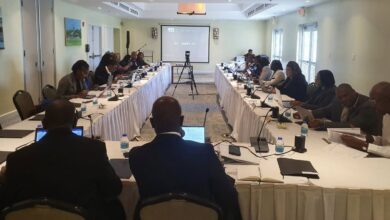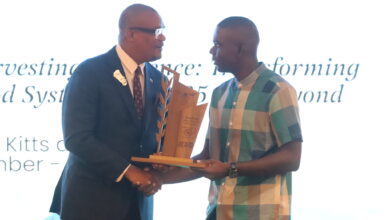|
At its Fourteenth Inter-Sessional Meeting (in Port-of-Spain, Trinidad and Tobago, 14-15 February 2003), the Conference of Heads of Government of the Caribbean Community “considered the situation developing over Iraq and expressed their profound concern at the escalation of global tensions and their grave implications for the preservation of international peace and security.”
Since then there has been an outbreak of war. The Caribbean Community regrets the resulting loss of life on all sides. The Community recognizes that the conflict will entail political and economic consequences, which have broader, long-term implications for international peace and security. The Caribbean Community, as a grouping of small states and an integral part of the international community, must continue to rely heavily on the United Nations, the primacy of international law, and adherence to international obligations for the protection of its sovereignty, territorial integrity and the furtherance of its interests. It is therefore the view of the Community that in the post-war environment in Iraq, the United Nations must play a central role in the provision of humanitarian assistance and in the rehabilitation and reconstruction of that country’s political, institutional and physical structures. The interests and will of the Iraqi people must be paramount in this process. Indeed, durable peace and stability in the aftermath of this conflict can only be ensured by a just, equitable and collective approach in which the United Nations must play a central role. The need for the United Nations and the authority of the Security Council has never been greater than it is today. In an increasingly inter-dependent world, all nations now must co-operate and collaborate in a wide diversity of areas. Global governance will only succeed if it is based on multilateralism. The interests of all mankind rest on a world where peace and harmony prevail. The world community, in accordance with the UN Charter, must be united to heal rifts wherever they loom and resolve conflict wherever they threaten, however protracted and difficult it may be to find a solution. The Caribbean Community expresses grave concern over the consequences of the conflict in Iraq on the Region’s economy:
A larger proportion of already scarce resources will have to be allocated to addressing heightened security concerns.These all have negative implications for the socio-economic development of the Region and the quality of life for the people of the Community. In this uncertain and dynamic international environment, Heads of Government will continue to monitor this situation and to consult among themselves. Further, they have mandated their Foreign Ministers, to treat to any developments on the matter at the forthcoming Meeting of the Council for Foreign and Community Relations (COFCOR). |
Press ReleasesStatements and Declarations





